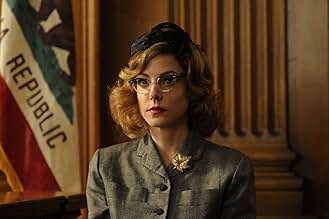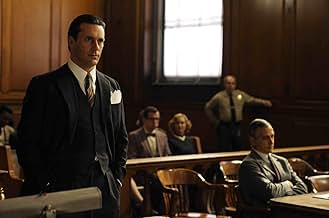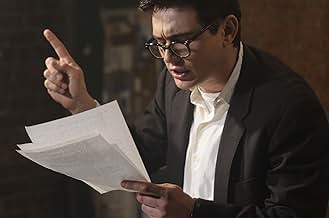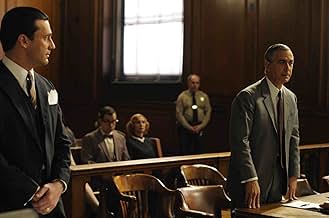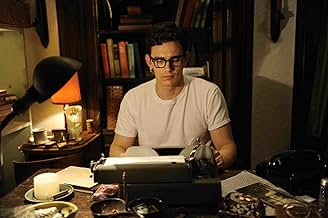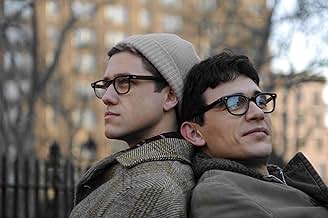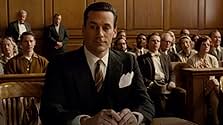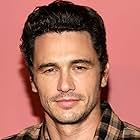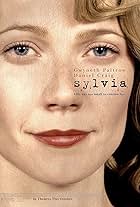As Allen Ginsberg talks about his life and art, his most famous poem is illustrated in animation while the obscenity trial of the work is dramatized.As Allen Ginsberg talks about his life and art, his most famous poem is illustrated in animation while the obscenity trial of the work is dramatized.As Allen Ginsberg talks about his life and art, his most famous poem is illustrated in animation while the obscenity trial of the work is dramatized.
- Directors
- Writers
- Stars
- Awards
- 2 wins & 8 nominations total
Kaydence Frank
- Allen's Girlfriend
- (as Kadance Frank)
Allen Ginsberg
- Self
- (archive footage)
- Directors
- Writers
- All cast & crew
- Production, box office & more at IMDbPro
Featured reviews
This is a brilliant film. I have not seen a another film that successfully shows how someone creates a work of art, especially a literary work. This film does it brilliantly, largely by quotations from the poem read very effectively by James Franco, who plays Ginsberg. Acted out interviews illuminate many things and the trial itself is extremely involving to watch. Even the animated portions we see while we hear parts of the poem work well. It's a remarkable film about artistic creation and how the artist must be allowed to use his own words and to use language that expresses his meaning fully, not language that is inoffensive to some imaginary reader.
Franco, John Hamm, David Strathairn, Bob Balaban, Jeff Daniels are all at their best, and seem truly committed to the project.
You don't even have to be a fan of Ginsberg, or know much about who he was to enjoy this. I was really impressed, one of the best films of this year, but it will likely be ignored by many.
Franco, John Hamm, David Strathairn, Bob Balaban, Jeff Daniels are all at their best, and seem truly committed to the project.
You don't even have to be a fan of Ginsberg, or know much about who he was to enjoy this. I was really impressed, one of the best films of this year, but it will likely be ignored by many.
Watched in June 2010 I've never read Howl or really have had much interest in Allen Ginsberg, but having seen this delight of a film, things have changed.
The film takes a look at several key moments in Ginsbergs life. In B&W we see Ginsberg recite his poem Howl: there are also insights into his friendships with Jack Kerouac, Neal Cassady and his relationship with Peter Orlovsky. The reading of the poem is segmented throughout the film and in between these segments we see Ginsberg being interviewed, whilst we never see the interviewer, we do see Ginsberg talk about his life. The other main element is the trial of Howl, which was deemed obscene. All these aspects combine well and it never feels disjointed; they are nicely contrasted and offer great insights into the life of Ginsberg.
Add to this some wonderful animation that plays during much of the recital of Howl; it creates something of a reality to the poem and made it even more stunning and graphic and tragic and beautiful. The trial scenes are fascinating with the constant questioning by the prosecution as to what certain lines or words meant. And how wonderful the judge, who seemed to have made his decision well before the trial was over. Thank goodness for him.
James Franco plays Ginsberg and does so well, although he doesn't have too much to do, he is mostly either being interviewed or reciting; but it is in this he impresses, the passion, the intensity of the piece shines through: the ending of Howl, known as 'Footnote to Howl' is brilliantly spoken and I found it hugely emotional. The film has a slight doco feel to it at times, but it is otherwise an absorbing and wonderfully told account.
The film takes a look at several key moments in Ginsbergs life. In B&W we see Ginsberg recite his poem Howl: there are also insights into his friendships with Jack Kerouac, Neal Cassady and his relationship with Peter Orlovsky. The reading of the poem is segmented throughout the film and in between these segments we see Ginsberg being interviewed, whilst we never see the interviewer, we do see Ginsberg talk about his life. The other main element is the trial of Howl, which was deemed obscene. All these aspects combine well and it never feels disjointed; they are nicely contrasted and offer great insights into the life of Ginsberg.
Add to this some wonderful animation that plays during much of the recital of Howl; it creates something of a reality to the poem and made it even more stunning and graphic and tragic and beautiful. The trial scenes are fascinating with the constant questioning by the prosecution as to what certain lines or words meant. And how wonderful the judge, who seemed to have made his decision well before the trial was over. Thank goodness for him.
James Franco plays Ginsberg and does so well, although he doesn't have too much to do, he is mostly either being interviewed or reciting; but it is in this he impresses, the passion, the intensity of the piece shines through: the ending of Howl, known as 'Footnote to Howl' is brilliantly spoken and I found it hugely emotional. The film has a slight doco feel to it at times, but it is otherwise an absorbing and wonderfully told account.
In admiration of James Franco and his portraying a literary person is why I wanted to see this film. Since I'd never read the poem "Howl" by Allen Ginsberg (& I knew of Ginsberg in his later years as he was fairly renown as almost an elder poet statesman), I actually dug up a copy of "Howl" and read it before I viewed the movie. It turns out that it wasn't necessary to have read "Howl" -- the film sufficiently presents the poem and its complete text so that the viewer gets a good understanding just from the movie itself (at least I thought so...). This occurs in not only Franco's public reading of "Howl," it is brought out in the animation aspect of the film -- for me the animation was unexpected yet not intrusive. What is the film's major strength is James Franco's portrayal of Ginsberg. Franco's actual physical resemblance to the younger Ginsberg adds to his portrayal and his public reading of "Howl" is also quite good.
What is additionally satisfying in my mind is the evoking of a time and place (mid 1950s America) when a group of writers and quasi-vagabonds lived their lives on their own terms (& not in accordance to what was then considered the status quo) and wrote about it. This is brought out in depictions of Ginsberg's relationships and also in the court room obscenity battle about "Howl."
What is additionally satisfying in my mind is the evoking of a time and place (mid 1950s America) when a group of writers and quasi-vagabonds lived their lives on their own terms (& not in accordance to what was then considered the status quo) and wrote about it. This is brought out in depictions of Ginsberg's relationships and also in the court room obscenity battle about "Howl."
I was lucky to watch this movie at the Athens Film Festival last Saturday and, despite its occasional flaws, I loved it. Ginsberg is fairly known to Greece , though most people (myself included) got to know him through his connection with Dylan. In that sense, I wasn't familiar with HOWL or the obscenity trial. For me , the movie's main attraction is the fact that it is not a biopic but a study on the creation of poetry, the power and magic of the words, the creator's struggle for genuineness through a dark path of madness and sexual frustration. The film is an unusual blend of poetry recitation, psychedelic animation, a graphic dramatization of Ginsberg's interview and a straight-forward dramatization of the trial.Some of them work fine and some not. Franco catches the right spirit of a young poet striving to find his way of expression and he is magnetic both in the recitation and in the interview scenes.The trial scenes , though well acted, seemed a little flat to me as compared to the vibrant tone that the poem itself imposes to the film . The animation was a bit uneven , in cases great (the Moloch section was terrific) , in cases indifferent and sometimes, for me, annoying. Apart from those parts that didn't work for me to the extend that I expected , the film is a unique docudrama, a magnificent and courageous ode to the power of words and the freedom of speech and a great depiction of the personal struggle of an artist to be truthful to himself.
"I saw the best minds of my generation destroyed by madness, starving hysterical naked, dragging themselves through the Negro streets at dawn looking for an angry fix, angel headed hipsters burning for the ancient heavenly connection to the starry dynamo in the machinery of night
"
So begins the poem "Howl" by Allen Ginsberg who was one of the most respected writers and acclaimed American poets of the so-called Beat Generation of the late 1950s, poets that included Jack Kerouac, William Burroughs, Lawrence Ferlinghetti, Gregory Corso and others. The poem about sex, drugs, politics, and race shocked many people when first published with its explicit language and sexual images and became a cause célèbre leading to an obscenity trial in San Francisco that tested the limits of the First Amendment. According to Ginsberg, reflecting the culture of the fifties, "If you could write about homosexuality, you could write about anything."
Directed by Rob Epstein and Jeffrey Friedman, the film Howl is a celebration not only of the poem but of the artist who, amidst the turbulence that surrounded its initial publication, sought to define his own identity. It is a non-linear work that interweaves a reading of the poem by actor James Franco as Ginsberg with animation by the graphic artist Eric Drooker, a dramatization of the obscenity trial, and an interview with Ginsberg culled from the poet's own words. The film begins with the young Ginsberg reciting "Howl" in a coffeehouse to a young and approving audience. As the poem is being read aloud, the spoken words are animated on screen. Though expertly conceived, the animation creates a literal interpretation of the poem that fails to convey its power and beauty.
According to the poet, he never planned to publish "Howl" because he thought some of the language might offend his father and thus felt free to write anything that came to mind, knowing that no one would ever read it. Consequently, "Howl" delivers a wild torrent of words filled with lines about radical politics, drugs, and homosexuality conveying images that are often erotic and sometimes scatological. The poem may not always be understandable but, especially as read aloud, is filled with a rhythmic pulse that is pure music. The poem describes people who are in love, in pain, and in joy, people who "howled on their knees in the subway and were dragged off the roof waving genitals and manuscripts, who let themselves be f**ked in the a*s by saintly motorcyclists, and screamed with joy, who blew and were blown by those human seraphim, the sailors, caresses of Atlantic and Caribbean love, who balled in the morning in the evenings in rose gardens and the grass of public parks and cemeteries scattering their semen freely to whomever come who may."
The interviews reveal Ginsberg's mental state and how he ended up in a mental hospital, his only way out being to lie to the doctors that he would pursue heterosexuality. His friend in the institute, Carl Solomon to whom the poem is dedicated, however, had no easy way out, having to endure electro-shock therapy and a strait-jacket. Ginsberg's mother, Naomi, was also in a mental hospital for an unknown illness before she died. These troubling personal events in Ginsberg's life are integrated into the film in a way that is very moving although, because most of the poem consists of readings and conversations, the film itself is not very cinematic. One of the strong components is Ginsberg's homosexuality and the film depicts his relationships with Neal Cassidy and Peter Orlovsky with whom he loved and lived with for most of his adult life.
Using actual court transcripts, Howl also dramatizes the courtroom drama with attorneys played by Jon Hamm and David Straithairn arguing the case before the judge (Bob Balaban). Ginsberg himself was not at the trial since it was brought against the City Lights Publishers and Lawrence Ferlinghetti. The witnesses consisted of academics and literary figures either condemning the poem as worthless and without merit or praising it as an innovative and important work of art. The judge in the case eventually determined that the poem had "redeeming social importance," a landmark decision.
Franco's performance captures the energy of Ginsberg's poetry and his feelings about his life and art in the interview but overall fails to convey his warmth and humanity, his spirituality, his playfulness, or his progressive political views. In short, it succeeds in capturing most everything about the artist except the very qualities that make him so inspiring. As the film ends, we see updated information about those mentioned in the film while, in the background, we hear Ginsberg singing "Father Death Blues," a moving ode to the death of his father in a version by the aging poet as he nears the end of his life.
"Father Breath, once more farewell. Birth you gave was no thing ill. My heart is still, as time will tell. Genius Death your art is done. Lover Death your body's gone. Father Death I'm coming home."
Though Allen Ginsberg now home, his art will never be done.
So begins the poem "Howl" by Allen Ginsberg who was one of the most respected writers and acclaimed American poets of the so-called Beat Generation of the late 1950s, poets that included Jack Kerouac, William Burroughs, Lawrence Ferlinghetti, Gregory Corso and others. The poem about sex, drugs, politics, and race shocked many people when first published with its explicit language and sexual images and became a cause célèbre leading to an obscenity trial in San Francisco that tested the limits of the First Amendment. According to Ginsberg, reflecting the culture of the fifties, "If you could write about homosexuality, you could write about anything."
Directed by Rob Epstein and Jeffrey Friedman, the film Howl is a celebration not only of the poem but of the artist who, amidst the turbulence that surrounded its initial publication, sought to define his own identity. It is a non-linear work that interweaves a reading of the poem by actor James Franco as Ginsberg with animation by the graphic artist Eric Drooker, a dramatization of the obscenity trial, and an interview with Ginsberg culled from the poet's own words. The film begins with the young Ginsberg reciting "Howl" in a coffeehouse to a young and approving audience. As the poem is being read aloud, the spoken words are animated on screen. Though expertly conceived, the animation creates a literal interpretation of the poem that fails to convey its power and beauty.
According to the poet, he never planned to publish "Howl" because he thought some of the language might offend his father and thus felt free to write anything that came to mind, knowing that no one would ever read it. Consequently, "Howl" delivers a wild torrent of words filled with lines about radical politics, drugs, and homosexuality conveying images that are often erotic and sometimes scatological. The poem may not always be understandable but, especially as read aloud, is filled with a rhythmic pulse that is pure music. The poem describes people who are in love, in pain, and in joy, people who "howled on their knees in the subway and were dragged off the roof waving genitals and manuscripts, who let themselves be f**ked in the a*s by saintly motorcyclists, and screamed with joy, who blew and were blown by those human seraphim, the sailors, caresses of Atlantic and Caribbean love, who balled in the morning in the evenings in rose gardens and the grass of public parks and cemeteries scattering their semen freely to whomever come who may."
The interviews reveal Ginsberg's mental state and how he ended up in a mental hospital, his only way out being to lie to the doctors that he would pursue heterosexuality. His friend in the institute, Carl Solomon to whom the poem is dedicated, however, had no easy way out, having to endure electro-shock therapy and a strait-jacket. Ginsberg's mother, Naomi, was also in a mental hospital for an unknown illness before she died. These troubling personal events in Ginsberg's life are integrated into the film in a way that is very moving although, because most of the poem consists of readings and conversations, the film itself is not very cinematic. One of the strong components is Ginsberg's homosexuality and the film depicts his relationships with Neal Cassidy and Peter Orlovsky with whom he loved and lived with for most of his adult life.
Using actual court transcripts, Howl also dramatizes the courtroom drama with attorneys played by Jon Hamm and David Straithairn arguing the case before the judge (Bob Balaban). Ginsberg himself was not at the trial since it was brought against the City Lights Publishers and Lawrence Ferlinghetti. The witnesses consisted of academics and literary figures either condemning the poem as worthless and without merit or praising it as an innovative and important work of art. The judge in the case eventually determined that the poem had "redeeming social importance," a landmark decision.
Franco's performance captures the energy of Ginsberg's poetry and his feelings about his life and art in the interview but overall fails to convey his warmth and humanity, his spirituality, his playfulness, or his progressive political views. In short, it succeeds in capturing most everything about the artist except the very qualities that make him so inspiring. As the film ends, we see updated information about those mentioned in the film while, in the background, we hear Ginsberg singing "Father Death Blues," a moving ode to the death of his father in a version by the aging poet as he nears the end of his life.
"Father Breath, once more farewell. Birth you gave was no thing ill. My heart is still, as time will tell. Genius Death your art is done. Lover Death your body's gone. Father Death I'm coming home."
Though Allen Ginsberg now home, his art will never be done.
Storyline
Did you know
- TriviaShot in 14 days around New York City in March/April 2009.
- GoofsAbout 29 minutes in, Franco (as Ginsberg) lights up a cigarette. You can clearly see a layer of digital shading (meant to darken Franco's beard) that is overlaid onto his face, esp. his left jaw. This shading also goes over Franco's hand in this scene.
- Quotes
Allen Ginsberg: There's no beat generation. It's just a bunch of guys trying to get published.
- SoundtracksTonight at the Sands
Written by Jack Arel and Jean-Claude Petit (as Jean-Caude Petit)
ZFC Music (ASCAP)
Courtesy of FirstCom Music
- How long is Howl?Powered by Alexa
Details
Box office
- Gross US & Canada
- $617,334
- Opening weekend US & Canada
- $51,185
- Sep 26, 2010
- Gross worldwide
- $1,614,810
- Runtime1 hour 24 minutes
- Color
- Sound mix
- Aspect ratio
- 1.85 : 1
Contribute to this page
Suggest an edit or add missing content








